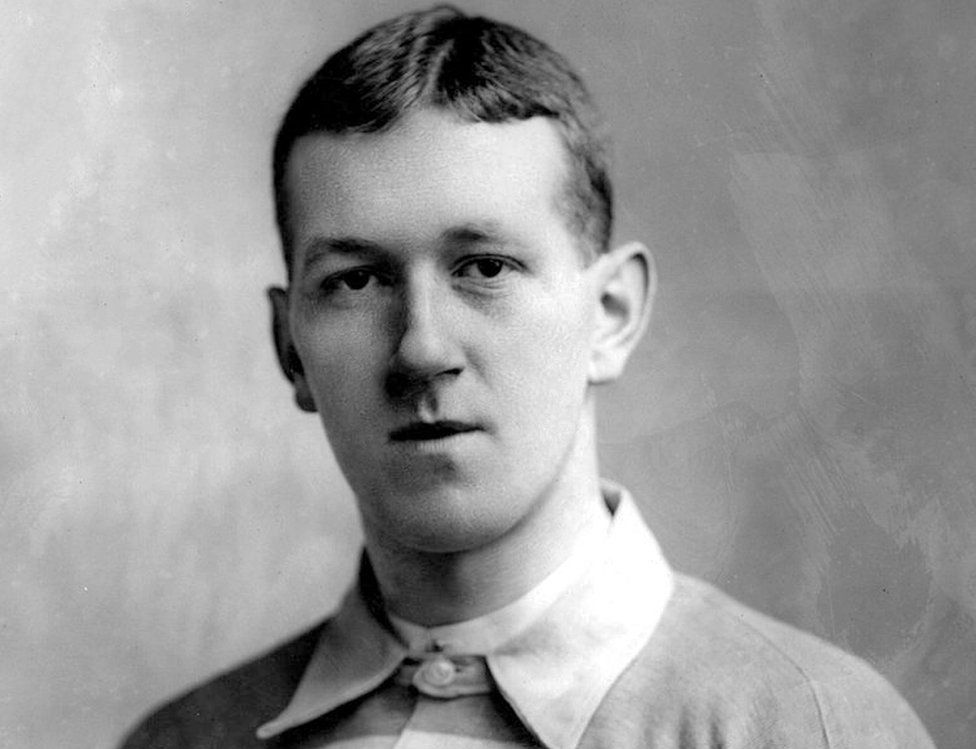RS McColl: The Scottish footballer turned corner shop king
- Published

His name is known nationwide from the McColl's convenience store chain but few are aware of the extraordinary footballing talents of RS McColl
Described as "the greatest centre forward in the world from the 1890s to the 1900s", Robert Smyth McColl was arguably football's first superstar. The Pele of his day.
BBC Scotland sport reporter Chick Young believes the player known as Toffee Bob would be worth between £25m and 30m if his career had been 100 years later.
McColl's, which has 1,400 stores, entered administration before being rescued by supermarket group Morrisons.
But what do we know of the man who put his name to a once thriving business empire?
Humble beginnings
McColl and his brother Tom were brought up in the Mount Florida area of Glasgow. Leaving school at 13, he earned just 81p a month as a clerk. Yet fame and fortune lay ahead.
He began his career with junior club Benmore in 1892 and moved to Queen's Park in 1894, before playing professionally with Newcastle United.
"We are not talking about a good player, we're talking about a brilliant player," explained Ged O'Brien, project director of the Scottish football museum, on a 2002 BBC Radio Scotland documentary on McColl's life.
For Scotland he managed feats unmatched by anyone else in dark blue. He scored hat-tricks on subsequent weekends against Wales and Ireland, and added another treble against England - the only man to score three against all of the home nations.
"He scored 13 goals in 13 internationals, it's quite remarkable," said Chick Young.
"Three hat-tricks over 13 months for his country. If someone was doing that now you would be talking about a £25-30m player."
McColl's ambitions took him south of the border, where Newcastle were prepared to pay him £5 a week, although it wasn't an altogether happy time for him.
"He came down with a very big reputation, so he was in effect a marked man in England," explained Newcastle's official historian Paul Joannou.
"Defenders really dished out quite a lot of punishment to him and its recorded he did suffer quite a lot at the hands of the rougher and tougher defenders."
'Toffee Bob'
With age and injuries, he knew his best footballing years were behind him, and began looking ahead to the future. His £300 signing on fee for Newcastle had give him a nest egg.
He had a hobby of making sweets and saw no reason why he couldn't match the other shops that were beginning to emerge.
He and his brother opened their first small shop in Queen Margaret Drive in Glasgow in 1901, selling sweets including toffees and chocolates gingers.
"Their most famous confectionary was cream caramels," explained nephew Donald McColl. "Lovely toffee done in a gold wrapper with the lion on it. They had a lion on their logo and on all their confectionary."
Bob McColl still played football up until 1910, scoring 37 times in 55 games for Rangers, then returning as an amateur to Queen's Park. In one of his final games he scored six goals against Port Glasgow.
By the mid-1920s McColl's had expanded to 150 shops in Scotland, the north of England and Northern Ireland. However, the Wall Street Crash in 1929 overnight cost them 80% of their wealth.
"They lost a lot of money in US steel," said Donald. "If they had been able to hang on to their shares they would have doubled their money in about seven years' time."
In order to offset the loss they sold the company to Cadburys but remained as directors.
By the time he retired from business in 1951, Toffee Bob had earned a prestigious place in Scotland's history. As a player with Queen's Park, Newcastle United and Rangers he was known as the prince of centre forwards. The newsagents he founded have until recently stood the test of time.
He died in 1958 having left a footballing and business legacy behind.
There were many examples of Bob's generosity. His Scotland team-mates from the 1900 win over England would be taken to Wembley. He founded the junior football competition the RS McColl cup, a trophy still played for today.
His daughter Nancy Thomson described him as a very modest and kind man.
"He had quite a sense of humour," she recalled.
"He was always very busy with the business but I remember the twinkle in his eye and I used to think: 'Here's a story coming up'."